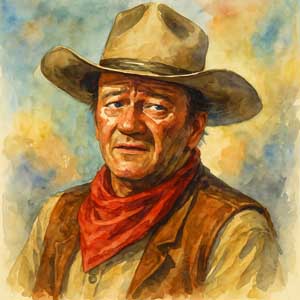 Born on this day in Winterset, Iowa (1907–1979), John Wayne—Marion Robert Morrison—rode through American film history with a steady stare and a spirit built for wide-open skies.
Born on this day in Winterset, Iowa (1907–1979), John Wayne—Marion Robert Morrison—rode through American film history with a steady stare and a spirit built for wide-open skies.
Nicknamed “Duke” after his Airedale dog, Wayne grew up with grit, earned a football scholarship to USC, and found his calling in the flickering light of Hollywood Westerns. “Courage,” he said, “is being scared to death—but saddling up anyway.”
His breakthrough came in 1939’s Stagecoach, directed by John Ford. It wasn’t just a role—it was a beginning. Under Ford’s keen eye, Wayne evolved from stuntman to legend, embodying a new kind of American mythos: honest, weathered, and true.
In The Searchers, he gave one of cinema’s finest performances—a man haunted by loss, forged by purpose. Critics admired, fans adored, and his shadow stretched across decades of silver screens.
He once said, “Nobody seems to like my acting but the people.” The people knew better. To them, he was a hero—flawed, faithful, and unflinching. A patriot who loved his country with clear eyes and open arms.
From his towering bronze statue at Orange County Airport to the enduring work of the John Wayne Cancer Institute, his legacy rides on—bold, enduring, unforgettable.
As Elizabeth Taylor once said, “He gave the world the image of what an American should be.”
As a child, I could recite every line of *Big Jake* by heart. So yes, John Wayne matters to me—not just as an icon, but as part of my story. A thread woven through memory, myth, and love.
 When the trail gets rough, ride harder. 🤠🐎
When the trail gets rough, ride harder. 🤠🐎
